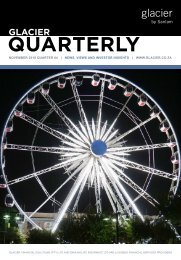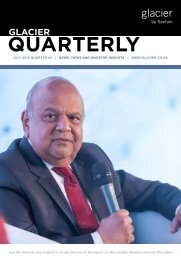Glacier Quarterly 1 - 2018
In this first edition of Glacier Quarterly for 2018, we cast our gaze across the year ahead – with a little more positivity than in previous years.
In this first edition of Glacier Quarterly for 2018, we cast our gaze across the year ahead – with a little more positivity than in previous years.
You also want an ePaper? Increase the reach of your titles
YUMPU automatically turns print PDFs into web optimized ePapers that Google loves.
TAX LANDSCAPE<br />
Who will pay the tax?<br />
Observations<br />
The <strong>2018</strong>/19 National Budget<br />
demonstrates that increasing individual tax<br />
rates (PIT) can no longer sustain SA, as it<br />
has for the past 10 years. Hence there was<br />
no option but to increase VAT to 15%.<br />
Future increases in VAT will have to be<br />
reserved to fund the promise of National<br />
Health Insurance (NHI). This means<br />
Treasury will inevitably have to seek<br />
alternative forms of taxation to fund the<br />
deficit.<br />
SA’s corporate tax rate is already too<br />
high by international and even African<br />
standards. The corporate tax contribution<br />
to the total revenue streams will continue<br />
to fade, in line with the international trend.<br />
The first immediate measure, announced<br />
in Budget <strong>2018</strong>/19, is the implementation of<br />
carbon tax from 1 January 2019. But there<br />
are many flaws inherent to the carbon tax<br />
model that must still be addressed prior to<br />
implementation.<br />
Conclusion 2<br />
There is no solution in the current tax<br />
base to solve SA’s problems without drastic<br />
increases in transaction taxes that will have<br />
the heaviest impact on the poor. Treasury<br />
will have to look for other tax solutions.<br />
French economist Thomas Piketty<br />
has gained traction among the world’s<br />
politicians with his book Capital In The 21st<br />
Century (2014). And his solution is wealth<br />
taxation.<br />
So when the world’s politicians<br />
descended on Davos in January <strong>2018</strong>,<br />
the likes of International Monetary Fund<br />
managing director Christine Lagarde<br />
started advocating wealth taxes. And that<br />
resonated with the SA delegation.<br />
Conclusion 3<br />
Forms of wealth taxation will almost<br />
inevitably be implemented in the medium<br />
to long term. And wealth taxation will have<br />
a profound impact on financial planning<br />
strategy in SA.<br />
However, more than R3 trillion of SA’s<br />
current wealth is held by retirement funds.<br />
And more than 70% of the retirement fund<br />
membership is the middle working class of<br />
SA, earning below R180 000 per annum.<br />
They are well represented by SA’s unions,<br />
to the extent that attempts so far to<br />
implement annuitisation of provident funds<br />
have failed.<br />
Conclusion 4<br />
Retirement funds are the people’s funds.<br />
It’s far easier for politicians to justify the<br />
implementation of forms of wealth taxation<br />
than to propose the use of retirement<br />
funds as any form of tax base.<br />
Retirement funds are the only<br />
investment platform in SA that guarantees<br />
a tax deduction on contribution plus a<br />
total tax exemption on investment growth.<br />
Yes, there is partial taxation on exit, but<br />
the effect of that can be minimised. And<br />
finally comes the cherry on the top, the<br />
exemption of retirement fund benefits from<br />
SA’s current wealth tax, estate duty.<br />
Conclusion 5<br />
South African retirement funds have<br />
received fantastic concessions over the<br />
past 10 years and have in many ways taken<br />
over the role previously played by trusts.<br />
SA faces an<br />
uphill fiscal<br />
battle in years<br />
to come<br />
Today many people under-utilise their<br />
retirement fund when designing a financial<br />
plan. This is a pity, as optimisation of<br />
retirement fund strategy takes many years<br />
to achieve.<br />
‘Mind-blowing’ legacy<br />
It’s human nature to want to leave<br />
a legacy for our families – so much so<br />
that we lose sight of the fact that with<br />
increased life expectancy, our children<br />
are today far more likely to inherit broke<br />
parents than any money when they die.<br />
Life expectancy for privileged South<br />
Africans is approaching 80. Thus, most<br />
surviving children will be over 50 before<br />
they inherit a cent. By then they’ll be<br />
facing their own problem of 30 years in<br />
retirement.<br />
So the ‘gift to last’ in estate planning<br />
and wealth creation is no longer the<br />
family mansion or the funding of the<br />
grandchildren’s private education, but<br />
rather a deposit on the retirement fund<br />
requirements of the next generation.<br />
What we’re actually looking for are<br />
intergenerational retirement funds. Isn’t<br />
that enough to blow the mind?<br />
<strong>Glacier</strong> is saddened to hear of the sudden passing<br />
of Professor Matthew Lester earlier in March, and<br />
expresses condolences to his family. Matthew was<br />
a regular contributor to <strong>Glacier</strong>’s publications and<br />
shared his knowledge – with a touch of humour –<br />
with our business partners at numerous events and<br />
roadshows. His contribution will be sorely missed.<br />
Matthew Lester<br />
Rhodes Business School<br />
professor and member of the<br />
Davis Tax Committee






